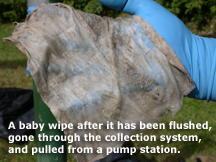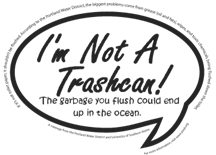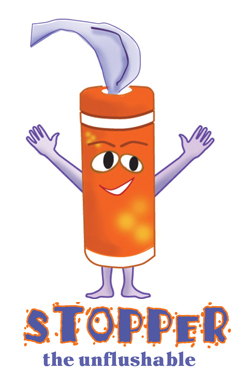Due to construction, we will not be conducting a rain barrel sales event in 2024. Please check back in 2025.
What You Can Do
There are many ways you can help improve our waters.
- Support Your Local Treatment Plant
- Flush ONLY Toilet Paper
- Keep our Waters Hazardous Chemical and Medicine-Free
- Safe Alternative to Harmful Household Cleaners
- Use Water Wisely
Support Your Local Treatment Plant
Be aware of your treatment plant's efforts to provide clean water. Visit your local treatment plant. Learn what special problems it must solve and what you can do to help.

Over the last decade the Portland Water District has experienced an increase in wastewater pump station malfunctions. Crews regularly unclog mounds of disposable wipes from pumps, at considerable expense and environmental consequence. When equipment clogs, wastewater backs up into homes and out overflow channels into our rivers and bays.
The Portland Water District URGES customers to flush ONLY toilet paper and human waste. Even though products may indicate they are biodegradable or can be flushed, they do not break down in time to make it through the wastewater process.
Support Our Efforts
Help get the word out about wipes and other materials not being flushed down the toilet.
Request this clear and black decal to place on your toilet.
Decal is a collaborative project between PWD and USM.


Keep our Waters Hazardous Chemical and Medicine-Free
Don't dump unused medicine or pour fats, grease, oils, solvents, pesticides, paint thinners, engine oil, or household cleaning products with hazardous chemicals down the drain or into storm sewers.
Discard expired or unused medication in household trash. Put it in a sealable plastic bag and crush medicine or add water to dissolve. Then add kitty litter, sawdust, coffee grounds, or another material that mixes with the medication. Seal the bag and put it in the trash. You may also be eligible to participate in the Safe Disposal for ME program. To learn more visit www.safemeddisposal.com or call 1.866.637.9743.
Hazardous chemicals should be brought to a hazardous waste site or transfer station that accepts the material. Use fertilizers carefully and only as directed. Try to find safe alternatives to products that can harm water supplies.


